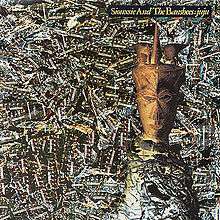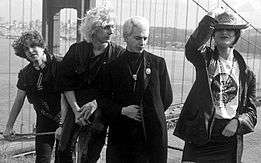Juju (Siouxsie and the Banshees album)
| Juju | |||||
|---|---|---|---|---|---|
 | |||||
| Studio album by Siouxsie and the Banshees | |||||
| Released | 6 June 1981 | ||||
| Recorded | 1981 | ||||
| Genre | |||||
| Length | 41:06 | ||||
| Label | Polydor | ||||
| Producer |
| ||||
| Siouxsie and the Banshees chronology | |||||
| |||||
| Siouxsie Sioux chronology | |||||
|
|||||
| Singles from Juju | |||||
|
|||||
Juju is the fourth studio album by British rock band Siouxsie and the Banshees. It was recorded at Surrey Sound studio with Nigel Gray as co-producer, and was released on 6 June 1981 by record label Polydor. Two singles were released from Juju: "Spellbound" and "Arabian Knights".
The album was commercially successful in the UK. It was acclaimed by critics upon its release, with praise given particularly to John McGeoch's unconventional guitar playing and Siouxsie's vocal performances. It remains a critical favourite and is seen as a landmark album of post-punk.
Background

After the slightly electronic bent of their previous album, 1980's Kaleidoscope, Siouxsie and the Banshees returned to a guitar-based sound for Juju, due to the presence of now-official guitarist McGeoch. The album also prominently featured the intricate percussion work of band member Budgie. According to Steven Severin: "Juju was the first time we'd made a "concept" album that drew on darker elements. It wasn't pre-planned, but, as we were writing, we saw a definite thread running through the songs; almost a narrative to the album as a whole".[1]
The album was recorded at co-producer Gray's Surrey Sound studio. There, McGeoch experimented with a rarely used guitar effects device called the Gizmo for the album track "Into the Light". Attached to the guitar's bridge, the Gizmo used keyed wheels to press the strings, giving a McGeoch's guitar the sound of a classical string instrument.[2] For "Arabian Knights", McGeoch transformed a tune by Siouxsie, initially in waltz rhythm, that she had composed on a Vox Teardrop guitar.[2]
The sleeve reproduced a picture of an African statue that the group found at the Horniman Museum in Forest Hill.[1]
Release and critical reception
| Professional ratings | |
|---|---|
| Review scores | |
| Source | Rating |
| AllMusic | |
| NME | very favourable[4] |
| Sounds | |
Juju reached No. 7 in the UK Albums Chart, remaining in the chart for 17 weeks.[6] The album was remastered and reissued in May 2006.
Upon its release, Juju received critical acclaim. Sounds hailed the album, observing that Siouxsie's voice "seems to have acquired a new fullness of melody" with "a rich, dark smoothness". Assessing the band's music, writer Betty Page noted: "The way this unit operates is impressively cohesive, like one brain the inventive musical talents of [guitarist] McGeoch, [drummer] Budgie and [bassist] Severin mesh perfectly with Siouxsie". She also praised McGeoch as being "the only man who can make an acoustic guitar sound foreboding".[5] NME considered that "Juju, their fourth LP [might be] their second best", qualifying it as "a peak in entertainment". Critic Paul Morley noted that Siouxsie "exult[ed] with priceless poise". He concluded, naming all the songs, saying : "Side one's highlights - 'Spellbound', 'Into the Light', 'Arabian Knights', 'Halloween' and 'Monitor'. The most consistent side since The Scream. Side two's highlights - 'Night Shift', 'Sin In My Heart', 'Head Cut' and 'Voodoo Dolly'. Juju is the first integrated and sparkling-complete Banshees since The Scream."[4]
In a retrospective review, AllMusic wrote, "The upfront intensity of Juju probably isn't matched anywhere else in the catalog of Siouxsie and the Banshees. Thanks to its killer singles, unrelenting force and invigorating dynamics, Juju is a post-punk classic."[3]
In 2007, The Guardian placed Juju on its "1000 Albums to Hear Before You Die" list, writing, "Perennial masters of brooding suspense, the Banshees honed their trademark aloof art rock to its hardest and darkest pitch on Juju."[7] Juju was also featured in the book 1001 Albums You Must Hear Before You Die.[8]
Legacy
In 1995, Melody Maker writer Cathi Unsworth described Juju as "one of the most influential British albums ever".[9]
McGeoch's guitar playing in particular was singled out for praise. Mojo honoured him in 2006 by placing him in their list of the 100 greatest guitarists ever for his work on "Spellbound".[10] Johnny Marr of The Smiths said on BBC Radio 2 in February 2008 that he also rated McGeoch highly for his work on "Spellbound". Marr qualified it as "clever", with a "really good picky thing going on which is very un-rock'n'roll".[2] In Uncut, Marr also rated McGeoch as his 10th favourite guitarist for his work on Juju and Real Life by Magazine.[11] Another member of The Smiths, singer Morrissey, commented on "Spellbound" during an interview for the US KROQ-FM radio station in 1997: "Another great single. A hit in England. Certainly not here, I don't think. But they were one of the great groups of the late '70s, early '80s. [...] Siouxsie and the Banshees were excellent [...]"[12] Morrissey later named Juju as a major album of the Banshees.[13]
Radiohead cited Juju, with Thom Yorke, Ed O'Brien and Colin Greenwood all mentioning their liking for the album.[14] O'Brien remembered recording "Spellbound" on a tape recorder after listening to the charts, noting that "it was a great era of music".[15]
Billy Corgan of The Smashing Pumpkins selected "Arabian Knights" when he talked about some of his favourite music on BBC radio.[16] Suede's singer Brett Anderson cited Juju as a reference point for Black Rainbows while composing material.[17]
Musical style
Juju is a post-punk album, and was listed solely as such by AllMusic.[3] The record was also qualified as "art rock" by The Guardian, which also dubbed the two singles as "pop marvels".[7] However, Juju has also been cited by certain critics as a gothic rock album,[18][19] though the band dispute such categorisation.[1] Siouxsie commented: "Gothic in its purest sense is actually a very powerful, twisted genre, but the way it was being used by journalists—"goff" with a double "f"—always seemed to me to be about tacky harum scarum horror, and I find that anything but scary. That wasn't what we were about at all".[1]
Track listing
All lyrics written by Siouxsie Sioux, except as noted; all music composed by Siouxsie and the Banshees (Sioux, Steven Severin, Budgie and John McGeoch).
| Side A | |||
|---|---|---|---|
| No. | Title | Lyrics | Length |
| 1. | "Spellbound" | Severin | 3:20 |
| 2. | "Into the Light" | 4:15 | |
| 3. | "Arabian Knights" | 3:23 | |
| 4. | "Halloween" | Severin | 3:37 |
| 5. | "Monitor" | 5:33 | |
| Side B | ||
|---|---|---|
| No. | Title | Length |
| 1. | "Night Shift" | 6:06 |
| 2. | "Sin in My Heart" | 3:37 |
| 3. | "Head Cut" | 4:22 |
| 4. | "Voodoo Dolly" | 7:04 |
| 2006 reissue bonus tracks | |||
|---|---|---|---|
| No. | Title | Lyrics | Length |
| 10. | "Spellbound (12" Extended Mix)" | Severin | 4:41 |
| 11. | "Arabian Knights (12" Vocoder Mix)" | 3:09 | |
| 12. | "Fireworks (Nigel Gray Unreleased Version)" | Severin | 4:13 |
Personnel
- Siouxsie and the Banshees
- Siouxsie Sioux – vocals, guitar on "Sin in My Heart"
- Steven Severin – bass guitar
- Budgie – drums, percussion
- John McGeoch – guitar
- Technical
- Nigel Gray – production
- Rob O'Connor – sleeve design
- Joe Lyons – sleeve photography
References
- 1 2 3 4 Paytress 2003, p. 106.
- 1 2 3 Mitchell, Pete (February 2008). "Spellbound: The Story of John McGeoch". BBC Radio 2. YouTube. Retrieved 3 November 2011.
- 1 2 3 DiGravina, Tim. "Ju Ju – Siouxsie and the Banshees". AllMusic. AllRovi. Retrieved 11 March 2013.
- 1 2 Morley, Paul (27 June 1981). Juju [album review]. NME.
- 1 2 Page, Betty (27 June 1981). "Siouxsie & The Banshees: Juju ****1/2". Sounds. Rock's Backpages. Retrieved 5 June 2013. (subscription required)
- ↑ "Siouxsie & the Banshees [uk charts]". officialcharts.com. Retrieved 29 April 2013.
- 1 2 Petridis, Alexis (21 November 2007). "Artists Beginning with S". guardian.co.uk. Retrieved 11 March 2013.
- ↑ Dimery, Robert (2005). 1001 Albums You Must Hear Before You Die. Cassell Illustrated.
- ↑ Unsworth, Cathi (14 January 1995). "Baby, Come Back". Melody Maker.
- ↑ "Mojo - 100 Greatest Guitarists Of All Time", Mojo, June 1996
- ↑ Marr, Johnny (November 2004). "Top Ten Guitarists". Uncut.
- ↑ "Morrissey – KROQ Interview, 7-6-97 (pt. 4/4)". morrissey-solo.com. Retrieved 11 March 2013.
- ↑ Deevoy, Adrian (October 2005). "Men of the Year". GQ. Retrieved 11 March 2013.
- ↑ Ryan Dombal. "Radiohead interview". Pitchfork. 28 March 2008. Retrieved 16 May 2016. "Yeah. In rehearsals yesterday, Thom, Ed and I were running through a Siouxsie and the Banshees cover called "Happy House" and Jonny [Greenwood]-- the young one-- was like, "What the fuck is this?" And we're like, "You know, Siouxsie and the Banshees! Check out Juju."
- ↑ Casandra Scaroni and Samuel Dietz (2 September 2011). "You've got to find a voice -work='Alltuntun". Retrieved 10 May 2016.
- ↑ "6 music playlist Billy Corgan". BBC.co.uk. Broadcast on 7 December 2014. Retrieved 15-5-2015
- ↑ "The Best Thing I've Heard – Brett Anderson Suede head". Mojo. Archived from the original on 16 March 2011. Retrieved 7 January 2012.
I've been listening to lots of my old records, like... Siouxsie & The Banshees' Ju Ju
- ↑ Reynolds, Simon (2005). Rip It Up and Start Again: Postpunk 1978–1984. Faber and Faber. ISBN 0571252273.
Juju, from 1981, is the Banshees' most perfect statement: every song feels like a chip off the same darkly lustrous block. Combine Join Hands and Juju and you have roughly 70 per cent of goth's sound and lyrical themes.
- ↑ Blackmore, Neil (2003). Buckley, Peter, ed. The Rough Guide to Rock. Rough Guides. pp. 941–942. ISBN 1843531054. Retrieved 14 June 2013.
Juju (1981; Polydor/Geffen). The Cure, Psychedelic Furs, Cocteau Twins owe their careers to this goth classic.
Sources
- Paytress, Mark (2003). Siouxsie & the Banshees – The Authorised Biography. Sanctuary Publishing Limited. ISBN 1-86074-375-7.